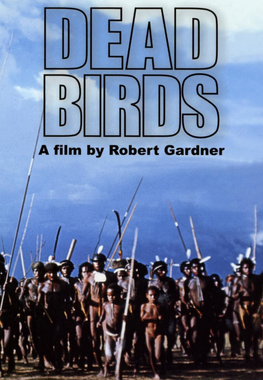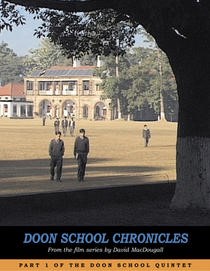
Lucien Giles Castaing-Taylor (born 10 January 1966, Liverpool, United Kingdom) is a British anthropologist and artist who works in film, video, and photography.

Lucien Giles Castaing-Taylor (born 10 January 1966, Liverpool, United Kingdom) is a British anthropologist and artist who works in film, video, and photography.
Castaing-Taylor received his B.A. at Cambridge University and his PhD at the University of California, Berkeley under Paul Rabinow. [1] [2] Since 2002 Castaing-Taylor has taught at Harvard University, [3] where he is Director of the Sensory Ethnography Lab. [4] His works include In and Out of Africa , [5] which he made with Ilisa Barbash in 1992. It is an ethnographic video about issues of authenticity, taste, and racial politics in the African art market that won eight international awards. He also recorded the film Sweetgrass (2009), which is described as "an unsentimental elegy at once to the American West and to the 10,000 years of uneasy accommodation between post-Paleolithic humans and animals." He is the founding editor of the American Anthropological Association’s journal Visual Anthropology Review (1991–94).

Dead Birds is a 1963 American documentary film by Robert Gardner about the ritual warfare cycle of the Dugum Dani people who live in the Baliem Valley in present-day Highland Papua province on the western half of the island of New Guinea in Indonesia. The film presents footage of battles between the Willihiman-Wallalua confederation (Wiligima-Alula) of Gutelu alliance (Kurulu) and the Wittaia alliance with scenes of the funeral of a small boy killed by a raiding party, the women's work that goes on while battles continue, and the wait for enemy to appear. In 1964 the film received the Grand Prize "Marzocco d'Oro" at the 5th Festival dei Popoli rassegna internazionale del film etnografico e sociologico in Florence, Italy, the Robert J. Flaherty Award given by the City College of New York, and was a featured film at the Melbourne Film Festival. In 1998, Dead Birds was included in the annual selection of 25 motion pictures added to the National Film Registry of the Library of Congress, being deemed "culturally, historically, or aesthetically significant" and recommended for preservation. Dead Birds has come to hold canonical status among ethnographic films.

Visual anthropology is a subfield of social anthropology that is concerned, in part, with the study and production of ethnographic photography, film and, since the mid-1990s, new media. More recently it has been used by historians of science and visual culture. Although sometimes wrongly conflated with ethnographic film, visual anthropology encompasses much more, including the anthropological study of all visual representations such as dance and other kinds of performance, museums and archiving, all visual arts, and the production and reception of mass media. Histories and analyses of representations from many cultures are part of visual anthropology: research topics include sandpaintings, tattoos, sculptures and reliefs, cave paintings, scrimshaw, jewelry, hieroglyphics, paintings and photographs. Also within the province of the subfield are studies of human vision, properties of media, the relationship of visual form and function, and applied, collaborative uses of visual representations.

Timothy Asch was an American anthropologist, photographer, and ethnographic filmmaker. Along with John Marshall and Robert Gardner, Asch played an important role in the development of visual anthropology. He is particularly known for his film The Ax Fight and his role with the USC Center for Visual Anthropology.
The USC Center for Visual Anthropology (CVA) is a center located at the University of Southern California. It is dedicated to the field of visual anthropology, incorporating visual modes of expression in the academic discipline of anthropology. It does so in conjunction with faculty in the anthropology department through five types of activities: training, research and analysis of visual culture, production of visual projects, archiving and collecting, and the sponsorship of conferences and film festivals. It offers a B.A. and an MVA in Visual Anthropology.

The Cinema Guild Inc. is an American film distribution company. It was established by Philip Hobel and Mary-Ann Hobel, producers known for their work in documentaries and features, including the film Tender Mercies.
Robert Grosvenor Gardner was an American academic, anthropologist, and documentary filmmaker who was the Director of the Film Study Center at Harvard University from 1956 to 1997. Gardner is known for his work in the field of visual anthropology and films like the National Film Registry inductee Dead Birds and Forest of Bliss. In 2011, a retrospective of his work was held at Film Forum, New York.

An ethnographic film is a non-fiction film, often similar to a documentary film, historically shot by Western filmmakers and dealing with non-Western people, and sometimes associated with anthropology. Definitions of the term are not definitive. Some academics claim it is more documentary, less anthropology, while others think it rests somewhere between the fields of anthropology and documentary films.

Sweetgrass is a 2009 documentary film that follows modern-day shepherds as they lead their flocks of sheep up into Montana's Absaroka-Beartooth mountains for summer pasture. It was directed by Lucien Castaing-Taylor, a Harvard anthropologist, and produced by his wife Ilisa Barbash. The title derives from Sweet Grass County, one of several in which the film was shot.
The Sensory Ethnography Lab (SEL) at Harvard University is an interdisciplinary center for the making of anthropologically informed works of media that combine aesthetics and ethnography. Production courses associated with the SEL are offered through Anthropology, Visual and Environmental Studies, and the Graduate School of Design.
The 26th Independent Spirit Awards, honoring the best independent films of 2010, were presented on February 26, 2011. The nominations were announced on November 30, 2010. The ceremony was hosted by Joel McHale.
Big Sky Documentary Film Festival is an annual non-fiction film festival held in Missoula, Montana each February. The event showcases documentary films from around the world. The festival first began in 2003 as a seven-day event. It is now a ten-day event. The Big Sky Documentary Film Festival is the largest cinema event in Montana. The festival presents an average of 150 non-fiction films annually at the historic Wilma Theater, The Top Hat, The Roxy Theater, and Crystal Theater in downtown Missoula.

Leviathan is a 2012 American documentary directed by Lucien Castaing-Taylor and Véréna Paravel of the Sensory Ethnography Lab at Harvard University. It is a work about the North American fishing industry. The film was acquired for U.S. distribution by The Cinema Guild. The film-makers used GoPro cameras and worked twenty-hour shifts during the shooting of the film.

Véréna Paravel is a French anthropologist and artist who works in film, video, and photography.
Ivan & Ivana is a documentary directed by Jeff Daniel Silva in 2011.
The Entrevues Belfort Film Festival is an annual international film festival, founded in 1986 by Janine Bazin and held in Belfort, France. Through its First Films International Competition, the festival is dedicated to support emerging filmmakers. Alongside of the International Competition, the festival focuses on rediscovering filmmakers from the cinematic heritage with retrospectives, tributes and encounters. It also offers a Post-production Grant for first international features films.
Since 1986, the festival has been successively directed by Janine Bazin (1986-2000), Bernard Benoliel (2001-2004), Catherine Bizern (2005-2012) and Lili Hinstin . Many first films of now renowned young directors were selected by EntreVues Belfort, such as:
John Melville Bishop is a contemporary, U.S., documentary filmmaker known for the breadth of his collaborations, primarily in the fields of anthropology and folklore. He has worked with Alan Lomax, John Marshall, and extensively with the Human Studies Film Archive at the Smithsonian Institution and the American Folklife Center at the Library of Congress. In 2005, he received a Lifetime Achievement Award from the Society for Visual Anthropology.

David MacDougall is an American-Australian visual anthropologist, academic, and documentary filmmaker, who is known for his ethnographic film work in Africa, Australia, Europe and India. For much of his career he co-produced and co-directed films with his wife, fellow filmmaker Judith MacDougall. In 1972, his first film, To Live with Herds was awarded the Grand Prix "Venezia Genti" at the Venice Film Festival. He has lived in Australia since 1975, and is currently a professor in the Research School of Humanities & the Arts at Australian National University.

Judith MacDougall is an American visual anthropologist and documentary filmmaker, who has made over 20 ethnographic films in Africa, Australia and India. For many of the films, she worked with her husband, David MacDougall, also an anthropologist and a documentary filmmaker. Both of them are considered among the most significant anthropological filmmakers in the English-speaking world.

The Doon School Quintet is a five-part ethnographic film series made by the American visual anthropologist and documentary filmmaker David MacDougall, between 1997 and 2000, at The Doon School, an elite all-boys boarding school in India. For thirteen months over three years, MacDougall lived with the students and was given unprecedented access for filming inside the residential campus. By the end, MacDougall had more than 85 hours of material, which he edited into 5 parts, with a total duration of about 8 hours. The project ranks among MacDougall's most ambitious and longest works and is the only film series in his oeuvre.

J. P. Sniadecki is an American filmmaker.